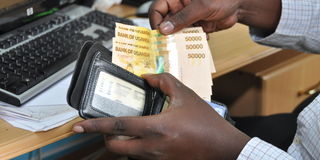Debt triggers

There are some habits you can start to free yourself from debt. PHOTO/Rachel Mabala
What you need to know:
Carrying large amounts of high-interest debt hurts your ability to save or invest and meet other needs.
To some, living debt-free is close to impossible. Although the extents differ from some people who go overboard to become its slave.
Carrying large amounts of high-interest debt hurts your ability to save or invest and meet other needs
But are you wondering how to end the debt rat chase?
Mr Livingstone Mukasa, the co- founder Four One Financial Services and Daniel Joloba, the managing director Rabboni Group, discussed the key principles that will enable you to live a debt-free life in a monthly financial literacy webinar.
From the macro level, when the government borrows money, it borrows it on behalf of Ugandans. The latest figures from the Parliamentary Committee on national economy indicated that every single Ugandan is in debt by Shs992,500. It will take about 94 years to clear that debt, Joloba assures. So, even if you don’t have a single debt in the bank or anyone, you are actually in debt.
Mukasa says most debt has negative connotations on people’s mind-set. Debt on its own is not bad, it is like how you handle money. On one side, you could have positive debt that pays itself. While negative debt is forcing you to earn money from somewhere and you use it, it should be looked at from both sides.
In reference to the FinScope Uganda survey report 2018, 54 per cent of Ugandans are inclined to borrowing informally from within close relations because people feel it is easier to access finance than from institutions. The bureaucratic processes could be lengthy.
Regardless of where one is borrowing from, how are you managing that loan better?
Types of debt
Some behaviours that drive people in debt are self-inflicted. Joloba explains the two kinds of debt. There is consumptive and productive debt. Productive debt is that taken to further a business in order to generate more money so that one can pay back and retain something.
While consumptive debt is borrowing money for consumption. You borrow money to pay school fees, rent or buy a car which is not an investment but for consumption. The mentality of wanting something now without the means to finance it, is one of the biggest drivers of debt. Hence one is forced to dip their fingers into another’s pocket.
“There is no willingness to wait or postpone gratification or can I prepare myself so that if I want to consume, I will wait for Time X to afford it.”
Also simple pride to attain a social status in society pushes one into debt to resonate or get approval from others.
Way forward
Joloba advises that if you are comfortable in your own skin, people’s opinions don’t matter neither can you succumb to peer pressure.
“Nobody gets prizes for being approved by another person. If you can’t afford to pay for a want in cash, then do not go for it,” says Joloba
Terms and conditions
Most people take on debt without knowing the cost implication. Debt has a series of not more than 15 costs like processing fee, legal, insurance, mortgage and others. However, most people only ask for the interest rate.
Joloba critically emphasizes, if you only know the interest rate and not the attendant cost associated with that debt, you realise later during the repayment processes. Make decisions that are long-term in nature and if you are uncomfortable with the costs, have the confidence to walk away.
Still from the survey, the remaining 46 per cent borrow but of this, 43 per cent adults borrow for consumption. 22 per cent borrow for unexpected expenses- emergencies that come up.
Mukasa notes, “because you can afford it, it does not mean you should buy it.”
Uganda has a high dependency problem. There are about six people that depend on each salary and this has created a saviour mentality to solve problems.
“Get to know your means and live below them not within. If you live within your means, your one punch away from disaster. The people that will survive are those who live below their means.”
In brief, if you earn Shs100,000, live as if you earn Shs70,000 or Shs80,000.
“Have you ever wondered why it takes you 30 days to get paid but you are broke on the 12th day?” Mukasa poses. That means you are not getting the math right, he says.
This game of creating wealth is a 20- 30 game. When all your bills are paid, it does not mean you are doing well.
Good debt
Good debt moves you from point ‘A’ to point ‘B’ in terms of earning and income. “You must have your own money that justifies why banks look for rich people to lend because they have assessed their assets and want to accelerate their positions to get money. A poor person is a liability to the bank,” Joloba says.
“When you have your own reserves or assets, you can trigger the debt issue to take you to another level. Do not look for debt to start a business or make weddings. If it earns you an income, then that’s good debt,” Joloba notes.
“A good debt is something that has the capacity to pay itself overtime and earns you something. Every time you take on debt, it’s a bet on your future income. It limits your ability to consume in the future,” Mukasa concludes.




